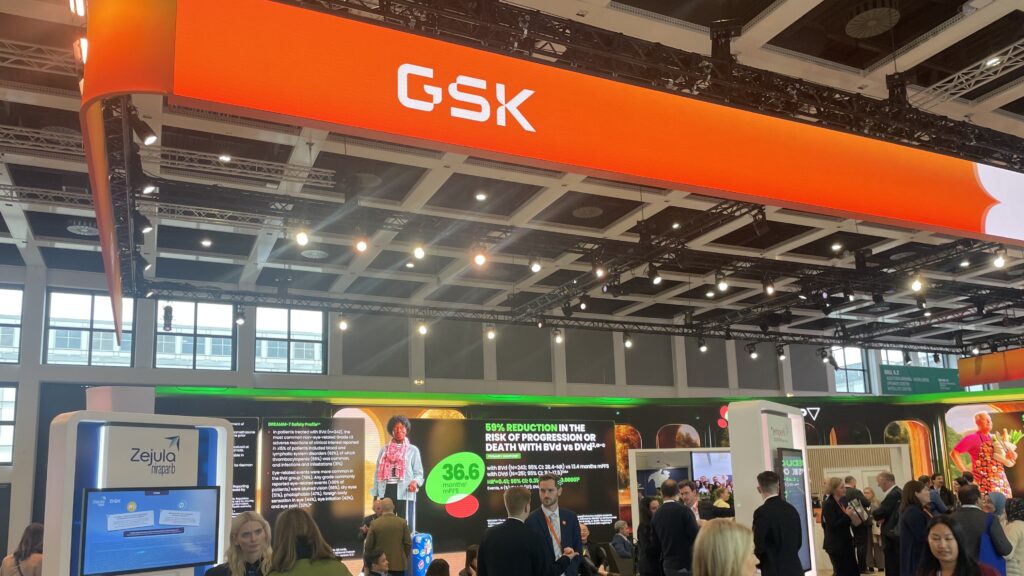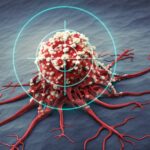GSK may be happy with the latest readouts from two Hansoh-partnered antibody-drug conjugates (ADCs), but the Big Pharma’s oncology R&D chief told Fierce to “stay tuned” for the company’s own data.
The European Society for Medical Oncology (ESMO) congress in Berlin saw studies on both candidates—a B7-H4-targeted ADC dubbed GSK5733584 and a B7-H3-targeted ADC called GSK5764227—published over the course of the weekend.
The data for the first asset GSK’584, also known as HS-20089, comes from the initial cohort of a phase 2 study conducted by Hansoh in patients with platinum-resistant ovarian cancer, fallopian tube cancer or primary peritoneal cancer. Patients received intravenous HS-20089 once every third work until they experienced objective disease progression or met other protocol-defined criteria for discontinuing treatment.
Across the 33 patients enrolled as of March 20, the confirmed overall response rate (ORR) was 48.5%, while the disease control rate was 75.8%.
Meanwhile, Hansoh presented updated data for GSK’227, also known as HS-20093, from 44 evaluable adults and adolescents with osteosarcoma in a phase 2 study. These patients showed an ORR of 6.7% and 17.2% at the 8 mg/kg and 12 mg/kg dose, respectively, with corresponding progression-free survival (PFS) of 4 and 8.4 months.
However, when GSK looked specifically at 20 other patients with different forms of sarcoma receiving 12 mg/kg dosing, the ORR reached 25% with a PFS of 8.2 months. Meanwhile, a subgroup of 13 patients with soft-tissue sarcoma patients saw an ORR of 23.1% and PFS of 9.4 months, the pharma noted.
The data from these China trials is “certainly extremely encouraging,” Hesham Abdullah, M.D., global head of oncology, research & development at GSK, told Fierce in an interview on the sidelines of the ESMO conference.
He pointed to the disease control across both osteosarcoma and soft tissue sarcoma in the GSK’227 study. “That’s not typical,” Abdullah said.
When it came to the tolerability of GSK’227 in Hansoh’s data, the presentation showed that 43.8% of patients experienced a serious treatment-related adverse event. Abdullah said this finding was “expected” as a higher dose of the ADC was used to try and treat sarcomas.
“This is something that we’re continuing to assess and evaluate,” he told Fierce. “But it seems like in certain types of tumors or cancers, you may need a higher dose to see the type of activity that is needed.”
Related
But rather than the Chinese data, GSK’s real focus is its own studies of both ADCs, including testing GSK’584 in the pharma’s priority areas of endometrial and ovarian cancer. In fact, the company has five phase 3 studies for the B7-H4-targeted ADC lined up to launch in the first half of 2026.
The latter part of the first half of next year will see GSK unveil its own data for the assets, which Abdullah hinted will be “in line with our expectations.” Meanwhile, the company recently dosed the first patient in a phase 3 study of GSK’227 in small cell lung cancer.
GSK secured the ex-China rights to the ADCs as part of a pair of licensing deals with Hansoh that saw GSK hand over a combined total of $270 million upfront back in 2023. The company isn’t the only European pharma to have spied potential in Hansoh’s ADCs—Roche kicked off ESMO by penning its own $1.4 billion biobucks deal for a CDH17-targeted candidate.
With a raft of ADC trials and readouts coming up, it sounds like GSK is gearing up for a big year for its oncology portfolio. When Fierce suggested that 2025 had seemed relatively quiet on the cancer front for GSK, Abdullah acknowledged this was a “fair comment,” but suggested it is more accurate to “look in totality at what’s been happening for GSK oncology over the past 18 to 24 months.”
He cited successful phase 3 trials and international approvals tied to the second coming of the multiple myeloma drug Blenrep, as well as a phase 3 win for Jemperli in endometrial cancer. GSK has also “done some really good business development” over this period, Abdullah pointed out, including acquiring precision medicine biotech IDRx and its phase 3-ready gastrointestinal cancer asset in January.
“We have a clinical stage pipeline of 15 clinical-stage [oncology] assets and quite a robust research portfolio—and we’re continuing to build,” he added.



